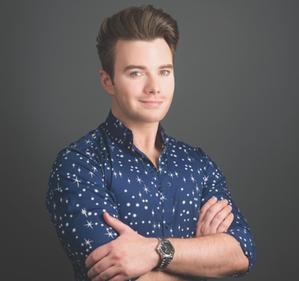 |
|
| Chris Colfer (photo: Andrew Scott) |
|
Chris Colfer is a bestselling author and Golden Globe-winning actor. He was honored as a member of the TIME 100, Time magazine's annual list of the 100 most influential people in the world, and his The Land of Stories series recently celebrated its 10th anniversary. Roswell Johnson Saves the World! (Little, Brown Books for Young Readers), an adventurous romp around the universe for middle-grade readers is Colfer's first work of science fiction. Here, he chats with Shelf about the fun of writing speculative books that take place in our world, the truth in his fiction, and just how autobiographical a book about alien adventures may be.
Would you kindly tell our readers what Roswell Johnson Saves the World! is about?
In a nutshell, Roswell Johnson is a story about a brilliant young boy who accidently gets abducted by aliens and has a wild adventure in space while trying to save Earth from an evil alien species.
This is your first work of science fiction, correct?
I have always been a huge fan of science fiction and thought I could add a funny, adventurous, and heartfelt story to the genre. I'm also hoping the story will make my young readers excited about science and curious about all the wonders our galaxy has to offer.
You note at the beginning of the book that, "while some elements in this book are exaggerated for dramatic effect, all science described is based on actual" science. How much of the content of the book is based on alien lore and how much is pure Colfer imagination?
I would say 10% is Colfer imagination but 90% of the book is inspired by real-life events and eyewitness accounts. I took liberty with the names and personalities, but almost every spaceship and alien I describe comes from a real report.
On that note, was it a ton of fun to come up with names, places, features of aliens, and alien planets?
I have never had so much fun writing something! Surprisingly, everything felt very natural and organic as I wrote it. I rarely had a moment when something didn't feel authentic. Many times, I would say to myself, "Yeah, that sounds right. What else would it be called? What else would those aliens do?" Maybe real aliens planted the information into my brain?
I loved that it's against intergalactic law for species in the Galactic Alliance to "disturb, disrupt, or displace" life-forms or ecosystems on other planets and that species need approval before "interaction, interference, or indoctrination." Did it take a long time to get this alliteration, or did it pop into your head fully formed?
For the most part, the story came to me fully formed. The Galactic Alliance and the Intergalactic Laws are based on the United Nations and the International Laws human beings are expected to follow. If I ever came to a roadblock, I would ask myself, "If this were all real, what's the most practical way aliens would deal with this situation?" That trick helped me a lot while building the story.
Music is really important in this novel. What drove you to include so many musical references?
Personally, I'm just a big fan of the Fugees, Whitney Houston, and David Bowie, so it was fun to give them a shoutout. While writing the A Tale of Magic series, I couldn't include any pop culture references because the story took place in a different dimension. It was so nice to finally include as many references as I wanted--almost like a pair of handcuffs had been unlocked. I hope the references will expand my readers' musical and cultural tastes.
Roswell Johnson is "one of the only Black students in his class" and he lives with his grandmother and grandfather on "one of the first Black-owned farms in the state of Oklahoma." What inspired you to write from this character's point of view?
I wanted to tell a story about a child who must save a world that isn't very kind to him. For me, the best protagonist for the task was a young man of color. I hope reading about Roswell's journey through the cosmos and his interactions with alien species of all different colors, shapes, sizes, and belief systems will show my young readers how pointless and damaging prejudice is. Every planet is stronger when it works together.
In 2021, you received a Free Speech Defender award from the National Coalition Against Censorship. At the beginning of a new series, how are you feeling about the increasing rate of book bans nationwide? Are you still dealing with your own books being banned?
I believe so. I find out watching the news just like everyone else. I'm not sure what infuriates me more about these book bans: the fact that the bans are happening, or that politicians aren't even being subtle about the type of books they're targeting. There is absolutely no reason why my books and countless others should be taken out of schools and libraries. These bans are purely meant to erase all compassion, understanding, and reference for the people these backwards laws are hurting. It's tyranny 101.
A few years ago, I attended a bookstore event you did in Boston, Mass. What has your relationship with indie bookstores been like? Are there particular stores you're always excited to visit?
I've always thought indie bookstores have better relationships with their customers. And vicariously, I get to have better relationships with my readers. I also love visiting indie bookshops on tour because I get a real sense of their community when I'm there. And I could never pick a favorite stop! They're all doing the lord's work.
Is there anything else you'd like to tell Shelf Awareness readers?
Roswell Johnson Saves the World! is much more autobiographical than you might believe, but I've been sworn to secrecy.... --Siân Gaetano, children's and YA editor, Shelf Awareness

